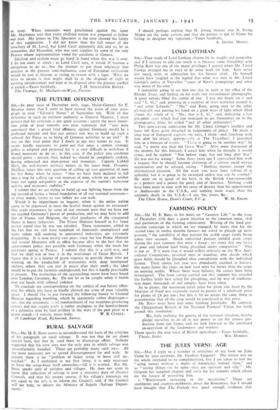FARMING POLICY SIR,—Mr. H. E. Bates in his notes on
" Country Life" in the issue of December 27th does a grave injustice to the common sense, skill and patriotism of the farming community. Writing of the food pro- duction campaign in which we are engaged, he states that for the second time in twelve months farmers are asked to plough up more pasture, " the suitabil:ty of that pasture for arable crops rarely being taken into account. Much converted pasture yielded grain crops during the past summer that were a fiasco ; yet every day one hears of poor and inferior land being ploughed under compulsion." This is not so. If it were true it would reflect seriously on the War Agri- cultural Committees, practical men of standing, who decide which grass fields should be ploughed after consultation with the individual farmer. Their choice last year was abundantly justified at harvest. On many farms the crops on new land were far better than the crops on existing arable. Where there were failures, the causes have been investigated. The farm survey carried out this summer has revealed the further fields best suited for ploughing, and by way of confirma- tion many thousands of soil samples have been taken.
As to plums, the maximum retail price for plum jam fixed by the Minister of Food was expressly stated to permit of a wholesale price for plums of £8 per ton ; but this is by no means the same thing as guaranteeing that all the crop would be purchased at this price.
Mr. Bates must have met some farming Jeremiahs. By contrast, the Chippenham Branch of the National Farmers' Union has lately passed this resolution:
We, fully realising the gravity of the national situation, hereby pledge ourselves to do all in our power to get the utmost pro- duction from our farms, and we look forward to the continued co-operation of the landowners and workers There speaks the true voice of British agriculture.—Yours faithfully,






























 Previous page
Previous page